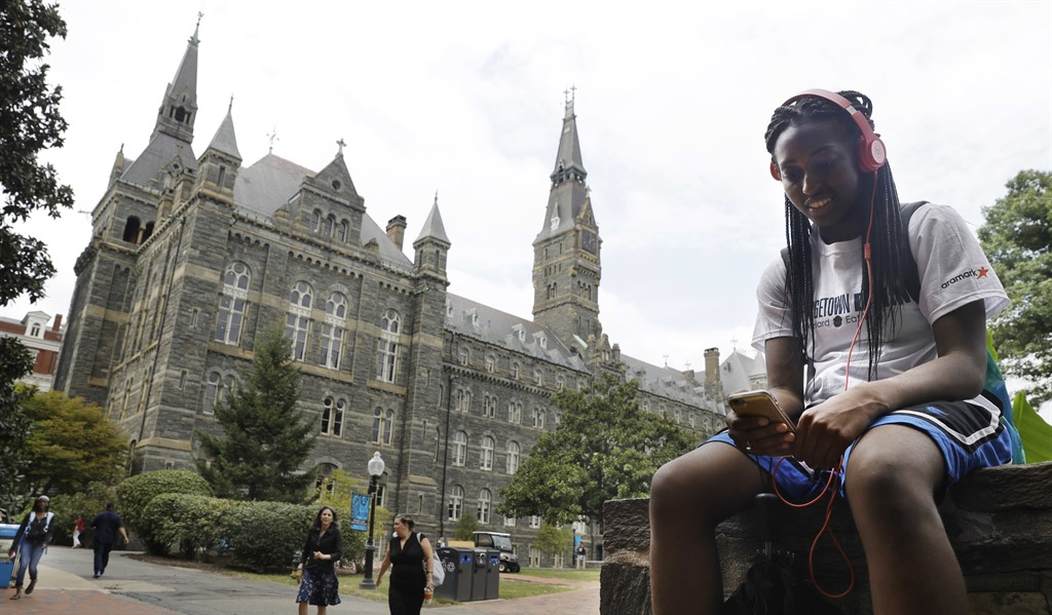The envelopes, please. (That's nervous sweat in the palms of the hands reaching for them.)
The future college Class of '21 is racing with caught breath and nervous fingers to check their email, pick up their snail mail and read their college letters. Many schools have already dispatched congrats and regrets to thousands of applicants, and the Ivy Leagues still have a week to go before they put their letters in the mail.
Anxiety runs high in Generation Z, or the post-millennials, or the iGeneration (choose your favorite label), as they figure out exactly what they want to study and how they'll pay for it. Those who put a label on this cohort haven't settled yet on what it will be. What is clear is that the generation is comfortable with social media, since it grew up on it. President Donald Trump's obsession with tweets doesn't surprise them. They're spontaneous with their iPads and smartphones, too. For them, it's as normal as a toddler walking, talking and bumping into the furniture.
You see these eager techies Googling for answers at the dinner table at home and supping in restaurants. Their greatest reference is Wikipedia, which speculates extensively on how to describe them. In Japan, this generation of those who have moved from mobile and text to video is called "Digital Natives," or "Neo-Digitals."
The young are often impatient with their elders' questions about the latest digital breakthrough, but most are bemused and willing to tutor them when exasperated by the latest "high-tech how-to." Parents and grandparents will miss their freshpersons when they leave for a distant campus. (That includes me.)
Recommended
It's unfair to label any group by generalizations, but we all do it, and statistics for this generation, including those college-bound and those who are not, show certain promising social-psychological-behavioral changes. The Annie E. Casey Foundation calculates a 40 percent decline in teenage pregnancy, a 38 percent decline in drug and alcohol abuse and a 28 percent decline in the numbers of teens who don't graduate on time.
Goals are changing, too. A survey by Northeastern University finds that 81 percent of this generation understands the importance of a college degree as necessary to achieve what they want to do in life. This is especially true for those with aspirations in high-tech industries, but it's heartening that it's also true for those pursuing the liberal arts. They watched their families -- and the country -- confront the Great Recession, which threatened to become a great depression, and they want to learn how to manage their money. Economists debate whether colleges should require courses in personal finance. This might even help graduates pay off their student loans. But with universities reducing required courses and students rebelling against authoritative dictates, such a mandatory course is unlikely to happen.
Computer science majors who aspire to be entrepreneurs are on the increase, many of them having noticed that the tiny country of Israel, though physically the size of New Jersey with a population of only 8 million, has more than 93 companies trading on the Nasdaq stock exchange, and that schools are only one component of Israel's high-tech start-up boom. Innovation and success are traced to "a parallel education system that operates alongside the formal one," Naftali Bennett, a high-tech veteran and the Israeli minister of education, tells The Wall Street Journal. He credits a value system that encourages teenagers to take responsibility for teaching younger children, as well as military conscription of both boys and girls at age 18. They serve for two or three years. Developing strategies for leadership focuses the mind for real-life tasks and stimulates technological thinking. A true education requires more than reading, writing and programming.
STEM courses -- science, technology, engineering and mathematics -- are the hot subjects for the Class of '21, and they may extend to the humanities. Janet Murray, who holds a doctorate in English literature from Harvard University and studied literary possibilities in the new digital medium at the Massachusetts Institute of Technology, teaches interactive fiction at Georgia Tech University. In "Hamlet on the Holodeck," a book about the future of narrative in cyberspace, she anticipates a new kind of storyteller who is "half hacker, half bard."
Every age, if not every generation, seeks answers to life's mysteries in its own way, drawing on insights and quotations of those before them. The Class of '21 is just now figuring out its own answers. The Bard of Avon himself wrote: "How beauteous mankind is! O brave new world,/ That has such people in't!" That's from -- no hacker, he. It's so deliciously succinct you can tweet it.

























Join the conversation as a VIP Member